Keep the Recyclables Stream Clean!
Last year, China announced “National Sword,” a change in its import policies that has a profound impact on recycling efforts in California. Strict new contaminant thresholds have been applied to certain grades of paper, and import bans on mixed paper and various grades of post-consumer plastics are in effect.
Recyclables continue to be collected and recovered. Mixed paper makes up over 40% of the material in the blue cart. There are very limited markets for mixed paper and various plastic containers.
We thank you for your efforts! See below for more information on how you can improve the recyclables stream.
Proper Sorting is a Must!
The cleanest and most efficient sorting starts with you, the generator. Please remember to:
- SUPPORT THE SORT!
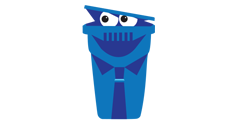
Please place recyclable materials only in your blue recyclables cart.
- JUST SAY “NO” TO CONTAMINANTS!
Remember to properly sort! Garbage, Organics and Hazardous Waste, such as batteries and sharps, DO NOT belong in the blue recyclables cart. For a list of what belongs in the Blue Recyclables cart, please click here.
Please Remember, These Items Are Not Recyclable: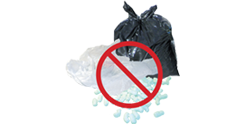
Plastic Bags: Put bags in the gray Garbage cart. Avoid single-use disposable bags whenever possible. Invest in reusable bags.
Packaging Peanuts: Contain peanuts in a sealed bag or box. Place in the gray Garbage cart or donate to a mailing store.
Keep the Recyclables Clean!
Take a few minutes to follow these tips to help keep contamination levels low and keep our workers safe.
- MAINTAIN A CLEAN STREAM!
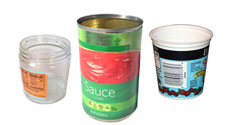
When possible, empty and rinse recyclable plastic, metal and glass food containers before placing them in the blue recyclables cart.
- KEEP AN EYE ON SIZE!
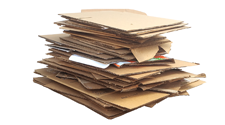
Corrugated cardboard and paper boxes should be flattened and large pieces cut to 2’ x 2’ or smaller. This prevents materials from getting stuck in the cart or blocking the hopper of the collection vehicles.
- PLEASE REMEMBER, HAZARDOUS WASTE DOES NOT BELONG:
Household Batteries: Put alkaline and lithium batteries in a clear, zipper lock bag on top of (not inside) the blue Recyclables cart. Sharps: Deliver to an Alameda County Household Hazardous Waste facility. The County accepts sharps, medications, pesticides, toxic cleaners and other hazardous waste. Visit StopWaste.org/hhw or call 1-800-606-6606 for more information.
Reduce, Refuse & Reuse Before you Recycle!
Small changes in your purchasing habits and daily routine can make a big impact in achieving zero waste!
- REPAIR INSTEAD OF PURCHASE.
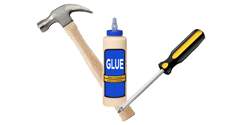
Before you replace an item, see if it can be repaired. If you do purchase something new, find the highest quality/longest lasting and most durable option possible.
- OPT FOR — USED PRODUCTS.
Reuse what you already have or purchase a “gently used” item from a resale shop or website. Share/trade items with friends and neighbors.
- CHOOSE REUSABLES.
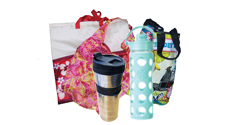
Shop with reusable bags and totes, bring your travel mug to the coffee shop and carry a reusable water bottle!
- AVOID SINGLE-SERVE OR SINGLE— USE ITEMS.
Skip the straw and single-serve condiments at restaurants.
- AVOID PURCHASING PRODUCTS WITH EXCESSIVE PACKAGING.
Choose products with minimal, compostable or recyclable packaging. Buy large sizes or in bulk.
- 40% OF FOOD IS WASTED IN AMERICA EVERY YEAR. AVOID FOOD WASTE.
More information and helpful tips can be found at www.StopFoodWaste.org.
- STOP UNWANTED MAIL.
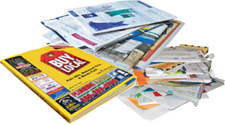
40% Of the material in the recycling stream is paper. Use these three easy steps to reduce paper in the blue recyclables split cart.
- Remove your address from direct mail registries at: https://www.directmail.com/mail_preference/.
- Discontinue unwanted catalogs at: CatalogChoice.org
- Prevent automatic phonebook deliveries at: YellowPagesOptOut.com.
Repurpose to Reduce Waste
Give new life to items destined for the garbage. Before you throw something away, consider using it for another purpose. Get creative!
HERE ARE A FEW FUN IDEAS.
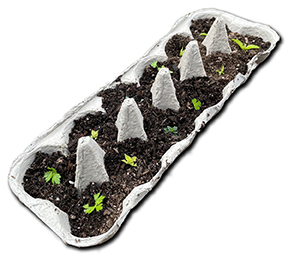 A drawer from an unwanted or damaged dresser can double as storage under your bed.
A drawer from an unwanted or damaged dresser can double as storage under your bed.
Empty toilet paper tubes, paper towel tubes, and egg cartons make great seed starters.
Non-donatable t-shirts, socks, and linens can be used as cleaning rags.
Jars can be used for a variety of organization and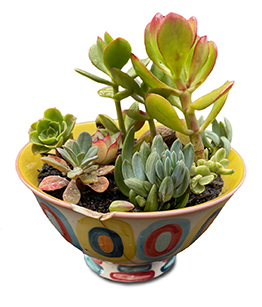 storage solutions.
storage solutions.
Chipped bowls, mugs, and teacups can be used as planters.
A stack of vintage suitcases can be used as an end table or nightstand and doubles as storage.
Glue wine corks together to use as coasters and trivets.
Browse social media and websites for more ideas and inspiration.
For more reuse and reduction tips and information please visit: www.StopWaste.org.
To view Media Response to the Recycling Markets Crisis, please click here.
